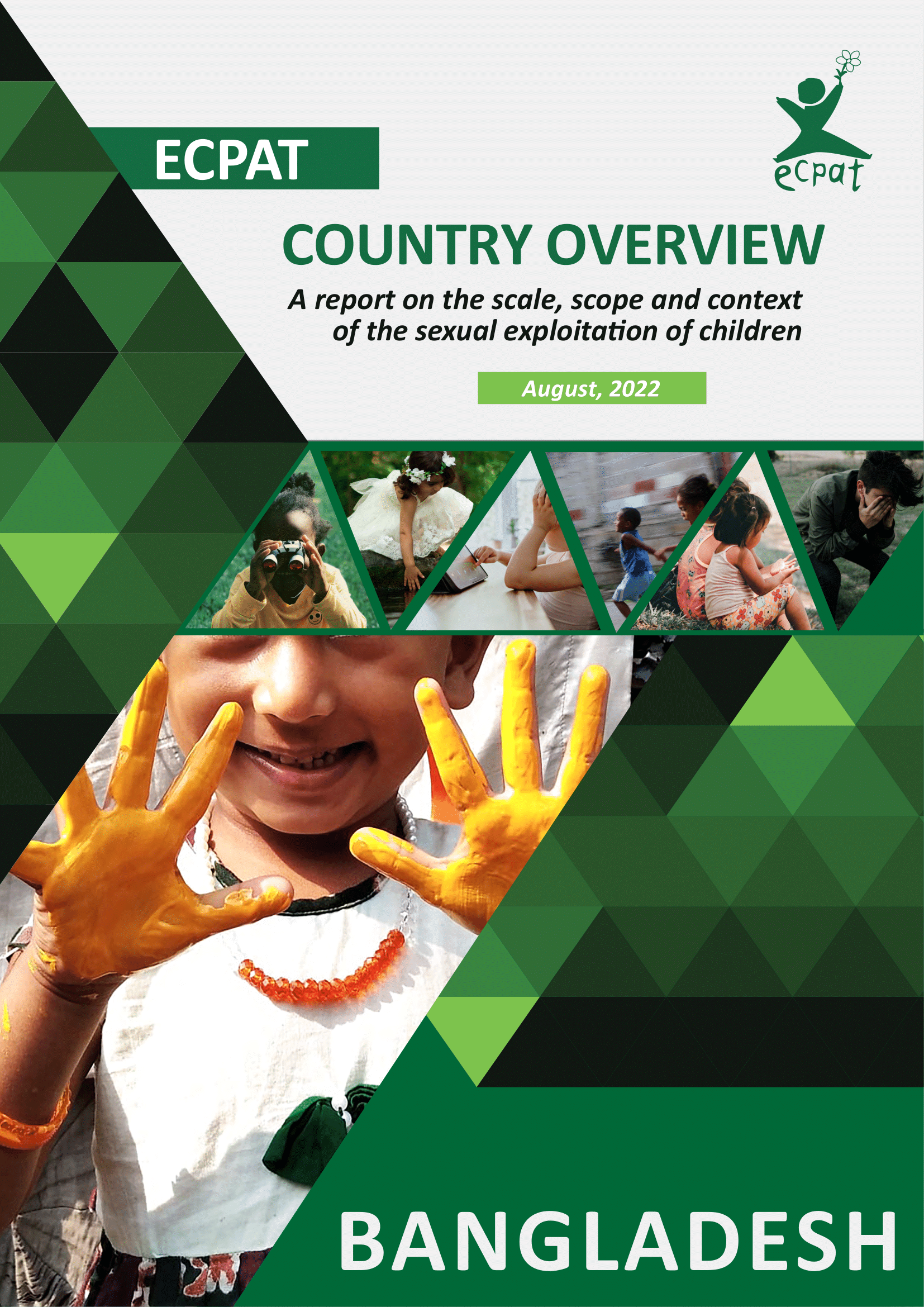BANGLADESH—In cooperation with the Association for Community Development (ACD) and the Down to Zero Alliance, ECPAT International is proud to announce the release of a new ECPAT Country Overview on Bangladesh. The report sheds light on the scale, scope, and context of sexual exploitation of children, and suggests concrete actions to eliminate the sexual exploitation of children in Bangladesh.
Key findings and recommendations for action discussed in the report include:
- Bangladesh should ensure the proper funding and implementation of all national action plans relating to the sexual exploitation of children. Bangladesh does not have a national action plan specifically dedicated to the sexual exploitation of children. Although sexual exploitation of children is partially addressed under other national plans of actions (NPA to End Child Marriage, NPA on Human Trafficking and a NPA on heath issue), a stronger focus is placed on child trafficking and child, early and forced marriage, while specific actions that address exploitation of children in prostitution, online sexual exploitation of children, and the sexual exploitation of children in travel and tourism are not given the same focus.
- Bangladesh should implement effective programmes that tackle the root causes of sexual exploitation of children such as poverty and lack of access to education – especially in vulnerable communities such as the Rohingya community. Since 2017, a substantial number of Rohingya people have lived in camps in Cox’s Bazar, with reports from December 2021 indicating among the total population, 451,662 were children. High rates of poverty within the camps, as well as the fact that 40% of boys and 93% of girls were not enrolled in secondary education, are likely to increase the vulnerability to sexual exploitation, including trafficking and child, early and forced marriage, of Rohingya children. In response to the vulnerability of the Rohingya children, the government has collaborated with a number of organisations to develop the Child Protection Sub Sector Strategy.
- Bangladesh should improve access to justice and right to remedies for child victims of sexual exploitation. This includes clearing the current backlog of cases related to sexual violence against children With the enactment of the Children’s Act in 2013, Bangladesh introduced a broad range of provisions that improved children’s legal right to access to justice and to appropriate remedies. However, clear difficulties persist in their practical implementation.
- Bangladesh should set up a strong and permanent mechanism to ensure children and survivors are participating in policy-making and evaluation of activities related to the sexual exploitation of children. Despite active child participation in a number of initiatives within Bangladesh, there is a lack of participation in government processes, relating specifically to sexual exploitation.
- Bangladesh should fund and conduct research on the sexual exploitation of children, in particular in travel and tourism, with a focus on domestic tourism and tourism identified for the purposes of sexual exploitation of children in Cox’s Bazar. Tourism has been increasingly important to the Bangladesh economy. However, due to a distinct lack of research into the issue, very little is known about the sexual exploitation of children in travel and tourism in Bangladesh.
- Bangladesh should amend the legislation to regulate the use of volunteers that work in roles with direct contact with children. As COVID-19 travel restrictions begin to lift and travel and tourism bounces back, measures need to be taken by companies that operate within the travel and tourism industry to ensure the protection of children.
Read the full report here.
Read a summary of the findings here.
For more information, please contact: communications@ecpat.org
About ECPAT Country Overviews:
ECPAT Country Overviews comprehensively present all the existing research and publicly available data about sexual exploitation of children in a country. A detailed analysis of the legal and policy framework for addressing these crimes is also included. The overviews provide an assessment of achievements and challenges in implementation, existing counteractions, and suggest concrete priority actions to eliminate the sexual exploitation of children in the target country.
About ECPAT International:
ECPAT International is a global network of over 122 civil society organisations, in over 100 countries, working towards the vision of ending the sexual exploitation of children. With over 30 years of experience in engaging with and managing multi-stakeholder processes and alliances across national, regional and global levels; ECPAT works to end the sexual exploitation of children. In Bangladesh, ECPAT members include The Association for Community Development’s (ACD’s), Aparajeyo Bangladesh and Ain o Salish Kendra (ASK).
About Association for Community Development (ACD):
The Association for Community Development’s (ACD’s) primary mandate is to ensure the rights of women and children in the greater Rajshahi region. Its programmes endeavour to integrate community development and human rights strategies; however, its focus remains on women, adolescents and children at the community level. ACD works to combat the trafficking and sexual exploitation of women and children.
About the Down to Zero Alliance:
The Down to Zero Alliance includes Terre des Hommes Netherlands, Defence for Children-ECPAT and ECPAT International, Free a Girl, ICCO (part of Cordaid) and Plan International Netherlands.
